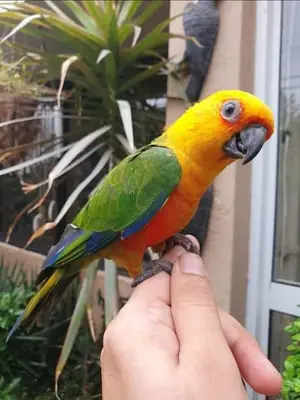Sun Conure: Traits, Care, Nutrition, Health and 2026 Guide
The Sun Conure is a vibrant parrot species that brings energy to the home with its bright yellow-orange colors, lively personality and social nature. In 2026, smart cage systems, enrichment technologies and specialized nutrition solutions make care easier and more enjoyable.
1. Species Profile
- Weight: 100 – 120 grams
- Length: 28 – 30 cm (including tail)
- Lifespan: 25 – 30 years (30+ years with excellent care)
- Temperament: Very social, energetic, playful; vocal and curious
- Feather colors: Bright yellow, orange, red, green tones
- Natural habitat: South America, particularly Brazil and Guyana
2. Cage and Living Environment Setup (2026)
- Cage size: Minimum 60x60x90 cm; larger cages recommended. Wide bar spacing (1.5-2 cm) and secure locks essential.
- Environmental control: With 2026 smart climate systems, maintain temperature 22-26°C, humidity 50-70%. Avoid direct sunlight but provide UV-A and UV-B light support.
- Toys and enrichment: Mental stimulation requires puzzle toys, chewing toys (natural wood), ladders and swings.
- Resting area: Multiple perch options (different diameters), sleep perch and hiding area important inside cage.
- Safety: Must be kept away from toxic plants, cigarette smoke, Teflon fumes. Ventilation is critical.
3. Nutrition and Diet Plan
Balanced nutrition is critical for vibrant feathers, healthy weight and long life in Sun Conures. Avoid seed-only diets; use diverse food sources.
| Food Group | Target Ratio | Examples | Role |
|---|---|---|---|
| High-quality pellet feed | 60-70% | Organic parrot pellets (vitamin/mineral fortified) | Base nutrition, vitamin/mineral balance |
| Fresh fruits | 15-20% | Apple, pear, mango, papaya, blueberries, raspberries | Vitamin C, antioxidants, fiber |
| Fresh vegetables | 15-20% | Broccoli, carrot, sweet potato, red bell pepper, corn | Beta-carotene, vitamin A, fiber |
| Seeds (limited) | 5-10% | Sunflower (limited), hemp, chia, flaxseed | Fatty acids, variety |
| Protein sources | Occasionally | Cooked egg (lightly), small amount low-fat cheese | Protein support |
| Calcium supplements | Constant access | Cuttlebone, mineral block, calcium supplements | Bone health, egg production |
Important notes: Avocado, chocolate, caffeine, alcohol strictly forbidden. Fresh water changed daily. Food can be divided into 2-3 small meals per day.
5. Health: Common Issues and Prevention
- Feather plucking: Can result from stress, loneliness, boredom or health issues. Environmental enrichment, socialization and veterinary check important.
- Obesity: Due to excessive seed consumption and inactivity. Apply balanced diet and exercise plan.
- Vitamin A deficiency: Critical for feather quality, respiratory health and vision. Add leafy greens and orange vegetables/fruits.
- Respiratory problems: Risk from dust, cigarette smoke, air pollution. Use good ventilation and air filtration.
- Psittacosis (parrot fever): Zoonotic disease risk. Regular veterinary checks and hygiene important.
- Beak and nail care: Natural perches and chewing toys for self-maintenance; professional trimming when needed.
- External parasites: Regular checks for ticks and mites.
- Diarrhea and digestive issues: Diet changes, hygiene and veterinary consultation.
6. Breeding and Nest Care (If Breeding Planned)
- Breeding age: around 2-3 years.
- Requires pair compatibility and adequate space.
- Nest box and suitable materials should be provided.
- Egg binding risk; calcium support and veterinary monitoring important.
- Chick care and socialization plan needed.
7. Travel, Safety and Emergencies
- Transport: Safe, ventilated travel cage for trips. Requires acclimation.
- Identification: Leg band, microchip (if possible) and photos.
- Emergency kit: Basic first aid supplies, veterinarian contact information.
- Escape prevention: Door and window security, wing clipping (carefully) or wing harness use.
- Toxic substances: Avoid cigarettes, Teflon, aerosol sprays indoors.
8. Frequently Asked Questions
How much do Sun Conures talk?
Have moderate speaking ability; can learn some words and sounds. Each bird is different; speaking is not guaranteed.
How loud are they?
Sun Conures are quite vocal; morning and evening calls especially can be noisy. Should be carefully considered for apartment living.
How to prevent feather plucking?
Can be prevented with socialization, mental stimulation, toy variety, balanced diet and veterinary check. Reduce stress sources.
How many hours out of cage?
At least 2-3 hours daily out-of-cage social interaction and exercise recommended.
Should wings be clipped?
Can be done for safety but must be careful. Should be done by veterinarian or experienced person. Flight ability should be partially preserved.
What toys are recommended?
Natural wood chewing toys, puzzle toys, ladders, swings and interactive enrichment toys.
What is the biggest feeding mistake?
Feeding seed-only diet; leads to obesity and vitamin deficiency. Pellet + fresh fruit/vegetable balance essential.
Are they good with children?
Can be compatible with proper socialization but children must be gentle and parental supervision needed. Beak bites can be painful.
Can they be kept with other birds?
Requires careful introduction and large cage. Individual character important; some are happier alone.
Any special winter care?
Humidity control (50-70%), temperature stability (22-26°C), UV light support and air quality important.
Is annual veterinary check needed?
Yes; annual general health check, feather, beak, nail and overall condition assessment recommended.
How to extend lifespan?
With balanced nutrition, socialization, mental stimulation, regular veterinary checks, safe environment and stress management, they can live 30+ years.
9. Conclusion
The Sun Conure is a social, energetic and colorful parrot species. With smart care systems, balanced nutrition plan, enrichment technologies and proactive health monitoring in 2026, they can live a happy 25-30 year life.

4. Socialization, Training and Mental Stimulation